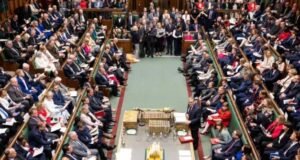 The government has decided to cut subsidies to householders installing rooftop solar panels by 65% just days after agreeing to move swiftly to a low-carbon energy future at the climate change conference in Paris.
The government has decided to cut subsidies to householders installing rooftop solar panels by 65% just days after agreeing to move swiftly to a low-carbon energy future at the climate change conference in Paris.
An impact assessment study by the Department of Energy and Climate Change (Decc) admits the move could wipe out up to 18,700 of the industry’s 32,000 jobs.
A second subsidy scheme known as the renewables obligation has also been cut for small-scale and large projects angering both the solar industry and environmentalists, who dismissed the moves as “huge and misguided”.
The government argues it needs to protect wider energy bills from the rising impact of renewable energy subsidies and that this justifies paying rooftop solar installers 4.39p per kilowatt hour from February instead of the existing 12.47p.
The new figure means Amber Rudd, the energy and climate change secretary, has rowed back from an original proposal to slash subsidies by 87% to 1.63p after a storm of criticism.
“My priority is to ensure energy bills for hardworking families and businesses are kept as low as possible whilst ensuring there is a sensible level of support for low carbon technologies that represent value for money,” she said.
“We have to get the balance right and I am clear that subsidies should be temporary, not part of a permanent business model. When the cost of technologies come down, so should the consumer-funded support.”
The government said there would be a £100m cap on spending by 2019.
The shadow energy and climate secretary, Lisa Nandy, said the solar cuts were misguided, especially after ministers had just forked out £175m to diesel farm developers.
“These short-sighted cuts will place big limits on our solar industry and lead to thousands of job losses. These cuts stand in stark contrast to the generous handouts ministers recently announced to dirty diesel generators. At a time when energy bills are a big concern it makes no sense to limit one of the cheapest forms of clean energy.”
Friends of the Earth said it was disappointing that less than a week after the UK government agreed a deal in Paris to keep global temperature rises to well below 2 degrees, the government had shown its true colours – “and they’re certainly not green”.
Alasdair Cameron, FoE’s renewable energy campaigner, said: “These huge, misguided cuts to UK solar are a massive blow for jobs and the economy, and further undermine the government’s already tarnished credibility on tackling climate change.”
The Solar Trade Association had warned that more than 6,000 jobs have been lost, with solar installers such as the Mark Group closing down ahead of likely cuts.
Greenpeace said the government was moving in the wrong direction. “Bowing to pressure from the public and businesses, the government has swapped a blunt axe for a sharp scalpel, but it’s still cutting in the wrong place,” said Barbara Stoll.
“In just one month, one nuclear plant at Hinkley would swallow up four years’ worth of subsidies for the whole solar sector. Why are ministers signing a blank cheque for expensive, outdated nuclear power while pinching pennies for an energy source on the cusp of a massive investment boom? This makes no economic sense and will only put up bills in the long run.
“With costs falling, demand rising, and post-Paris momentum growing, the UK solar sector will see off the government’s attacks. The question is how many more jobs, investments, and business opportunities are we wasting because of George Osborne’s incoherent policies.
“If the government is as committed as it claims to be to the Paris climate deal, then solar is one of the cheapest and safest ways for the UK to deliver on it.”
Paul Barwell, chief executive of the Solar Trade Association, said he was particularly concerned the government was cutting the “grandfathering” commitment from the renewables Obligation, which ensures that any subsidy levels are protected for the lifetime of a project.
“Closing the renewables obligation for solar is not in the interests of billpayers when solar is soon to become the cheapest low-carbon energy source. Following the Paris agreement, this needs rethinking.
“Removing the grandfathering guarantee makes no sense for solar – it’s the thin end of the wedge. If you invest £1m of capital into a solar project today, in 20 years’ time you have still invested £1m – it is a sunk cost. You cannot have the level of support changing over the lifetime of a project as investors won’t take the risk.”
 Weekly Bangla Mirror | Bangla Mirror, Bangladeshi news in UK, bangla mirror news
Weekly Bangla Mirror | Bangla Mirror, Bangladeshi news in UK, bangla mirror news







